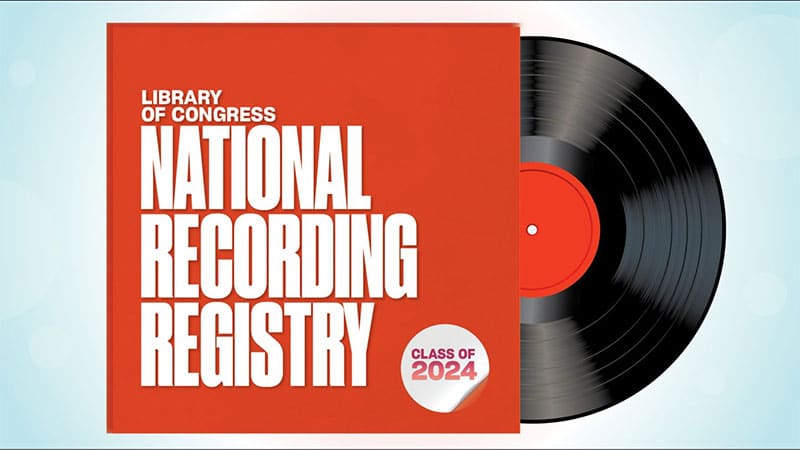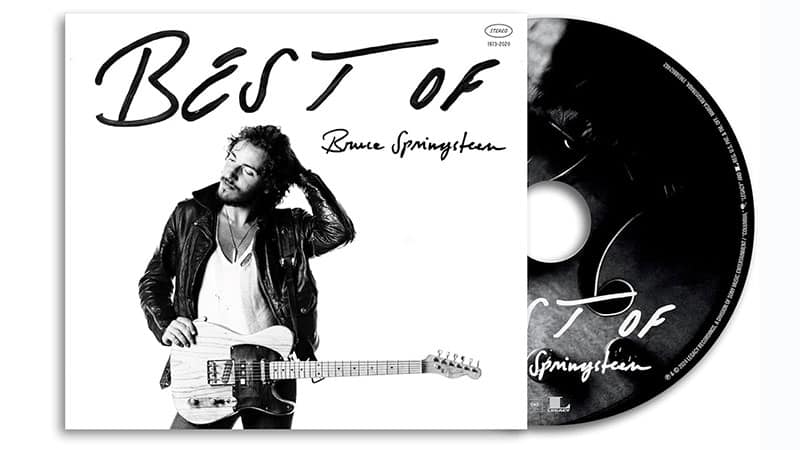Recordings from Gene Autry, Jefferson Airplane, Perry Como, Kronos Quartet, Johnny Mathis, Bobby McFerrin, and Patti Page, are also among 25 selected for preservation
ABBA’s Dancing Queen,” Blondie’s era-defining Parallel Lines, The Notorious B.I.G.’s landmark Ready to Die, Green Day’s Dookie, The (Dixie) Chicks’ Wide Open Spaces, and Lily Tomlin’s comedy have been selected as some of the defining sounds of history and culture that will join the National Recording Registry of the Library of Congress.
Librarian of Congress Carla Hayden has named 25 recordings as audio treasures worthy of preservation for all time based on their cultural, historical or aesthetic importance in the nation’s recorded sound heritage.
The 2024 class of inductees also includes Gene Autry’s “Rudolph, the Red-Nosed Reindeer,” The Cars’ debut album, Perry Como’s “Catch a Falling Star” / “Magic Moments,” Juan Gabriel’s heartbreaking “Amor Eterno,” Héctor Lavoe’s salsa hit “El Cantante,” Kronos Quartet’s “Pieces of Africa,” Johnny Mathis’ “Chances Are,” Bobby McFerrin’s “Don’t Worry, Be Happy,” Patti Page’s “Tennessee Waltz,” and Bill Withers’ “Ain’t No Sunshine.”
“The Library of Congress is proud to preserve the sounds of American history and our diverse culture through the National Recording Registry,” Hayden shares. “We have selected audio treasures worthy of preservation with our partners this year, including a wide range of music from the past 100 years, as well as comedy. We were thrilled to receive a record number of public nominations, and we welcome the public’s input on what we should preserve next.”
The recordings selected for the National Recording Registry bring the number of titles on the registry to 650, representing a small portion of the national library’s vast recorded sound collection of nearly four million items.
The latest selections named to the registry span from 1919 to 1998. They range from the recordings of the all-black 369th U.S. Infantry Band led by James Reese Europe after World War I to defining sounds of jazz and bluegrass, and iconic recordings from pop, dance, country, rock, rap, Latin, and classical music.
Billie Joe Armstrong, the lead singer and songwriter for Green Day, said that the band wasn’t thinking of making a generation-defining album of the mid-1990s when they started work on Dookie, their breakout record, in 1994.
“We always wanted to be in this band forever,” Armstrong said in an interview with the Library. “I think in the back of our minds was to be able to play music together for the rest of our lives. So that’s, that’s quite a goal when you’re 20 or 21 years old. But, you know, we’ve managed to do it, and it’s just been an amazing journey so far.”
One of the standout songs on the album was “Welcome to Paradise,” a song that Armstrong drew from his own life. He grew up in Rodale, California, then moved to West Oakland, living for a while in an abandoned industrial warehouse with more than a dozen other “punks, runaways and artists.”
The album has lasted three decades, he says because “the lyrics are just so honest and from where my life was at that time.”
Blondie was a New York band finding its way in the mid-1970s, deeply enmeshed in the city’s arts scene, but having more success in Europe after two albums than in the States. Lead singer Debbie Harry and guitarist Chris Stein counted a young Jean-Michel Basquiat as a friend. The pair bought his first painting on canvas for a couple of hundred dollars. They lived in a rough neighborhood, just off the Bowery and a few doors down from CBGB’s, which would become the epicenter of punk rock.
Then came Parallel Lines, their 1978 album that helped define New Wave music, spawning the massive hit “Heart of Glass” and putting them in the top tier of rock acts.
“Heart of Glass was the turning point,” Stein said in a joint interview with Harry. “That was just nuts what happened with that.”
The group was paired with producer Mike Chapman for the album. Chapman had a sharp ear for radio hits. In the studio, he didn’t have them play together as they had recorded in the past, but had them play individually, then stacked the tracks on top of one another to assemble the record. It made the group much more “precise,” Harry said.
Still, Harry said executives at Chrysalis Records weren’t happy when they first heard an album featuring “Heart of Glass,” “One Way or Another” and future album-rock favorites such as “Sunday Girl” and “Picture This.”
“The record company didn’t like it,” she said. “They didn’t hear any hits.”
But while Blondie went on to a career that featured platinum albums, No. 1 hits, and a place in the Rock & Roll Hall of Fame, both say that Blondie’s existence has always been more about pushing artistic boundaries than just pursuit of pop hits.
“The old problems of art and commerce are sometimes very restrictive,” Harry said, “and I think that we, somehow being a bit of a fringe element, got to do some things that were, you know, groundbreaking.”
Recordings Selected for the 2024 National Recording Registry:
- “Clarinet Marmalade” – Lt. James Reese Europe’s 369th U.S. Infantry Band (1919)
- “Kauhavan Polkka” – Viola Turpeinen and John Rosendahl (1928)
- Wisconsin Folksong Collection (1937-1946)
- “Rose Room” – Benny Goodman Sextet with Charlie Christian (1939)
- “Rudolph, the Red-Nosed Reindeer” – Gene Autry (1949)
- “Tennessee Waltz” – Patti Page (1950)
- “Rocket ‘88’” – Jackie Brenston and His Delta Cats (1951)
- “Catch a Falling Star” / ”Magic Moments” – Perry Como (1957)
- “Chances Are” – Johnny Mathis (1957)
- “The Sidewinder” – Lee Morgan (1964)
- “Surrealistic Pillow” – Jefferson Airplane (1967)
- “Ain’t No Sunshine” – Bill Withers (1971)
- “This is a Recording” – Lily Tomlin (1971)
- “J.D. Crowe & the New South” – J.D. Crowe & the New South (1975)
- “Arrival” – ABBA (1976)
- “El Cantante” – Héctor Lavoe (1978)
- “The Cars” – The Cars (1978)
- “Parallel Lines” – Blondie (1978)
- “La-Di-Da-Di” – Doug E. Fresh and Slick Rick (MC Ricky D) (1985)
- “Don’t Worry, Be Happy” – Bobby McFerrin (1988)
- “Amor Eterno” – Juan Gabriel (1990)
- “Pieces of Africa” – Kronos Quartet (1992)
- “Dookie” – Green Day (1994)
- “Ready to Die” – The Notorious B.I.G. (1994)
- “Wide Open Spaces” – The Chicks (1998)
NEWS: The @LibnofCongress has announced the annual selection of 25 recordings to be inducted into the National Recording Registry, chosen for their cultural, historic or aesthetic importance to preserve the nation’s recorded sound heritage. #NatRecRegistry https://t.co/rCFHon75Ct pic.twitter.com/2uHCcu5RnV
— Library of Congress (@librarycongress) April 16, 2024




